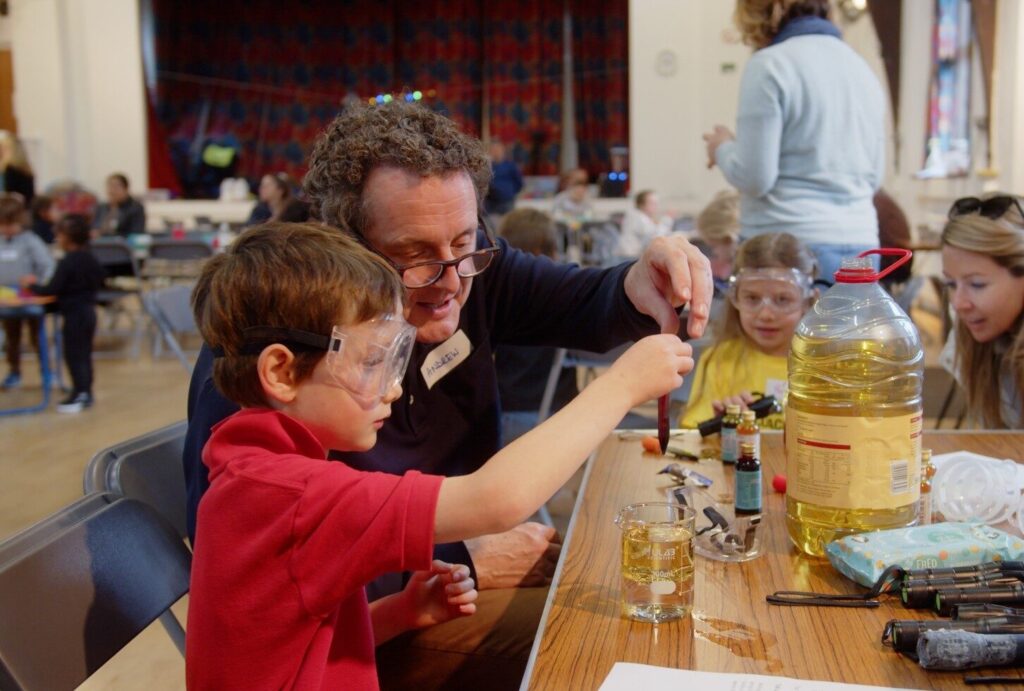Our thoughts on discipleship continue. Here is the summing-up that I wrote after recent discussions with people wiser than I am. By no means the end of the story but another step on it.
We are coming to see that discipleship in the Messy Church context is about some of the following:
Relationships: helping people to meet Jesus and get to know him more. People who have little or no church background to draw on or make assumptions about, need to trust the people / church who are introducing them to Christ. The way they will trust someone / an institution is through relationships. As Christians we do not have the automatic right to be heard, we need to earn it.
Ongoing: for many people becoming a Christian is as much or more about the present continuous – the becomING as about the conclusive decision to commit to Christ. For many it is a gradual ‘I am turning to Christ’ rather than an’ I turn to Christ’ moment in isolation. Messy Church may be about doing the groundwork so that people are in a position to say one day ‘I turn to Christ’ but the groundwork is crucial to get to that point. It cannot be rushed, any more than parenting a child can be rushed. Confrontation / issuing challenges of ‘Are you in or are you out?’ is inappropriate in this setting as people are in the process of learning to trust and don’t yet know if this is something they can start to trust. From the start of the Messy Church journey we have sensed the fragility of people ‘on the edges’, messily not in or out. Inviting them inwards is a gradual and ongoing process, not a one-off.
Yes, we need evangelists who will provide the opportunities / ‘excuses’ to make a decision to turn to Christ as well, and we need to equip team members with the words and ways of doing this. But at the moment, in our society, which is far away from any sense of Christianity being an acceptable expression of their spirituality, we need more groundwork than ‘flash moments’.
Lifelong: by encouraging people to find something in Messy Church not just for childhood but for teenage years and adult life, we are saying that discipleship doesn’t stop when you’re eleven. The presence of believing adults of all stages of life in this Messy community is a silent witness to the fact that Christianity lasts and is relevant throughout every stage of life.
Modelled: more is learned, arguably, in a deep-down ‘heart-known’ sense through having faith modelled than through cerebral teaching alone. This is especially relevant to families with children where more is ‘caught than taught’ as families observe each other. Children learn much by copying / imitating / playing. Messy Church leaders / teams need to model a Christian way of life in the two hours they have with the families. The experiential two-way interactive nature of what goes on in Messy Church encourages safe places to ‘play’ / ‘experiment’ / ‘learn’. In the triangle of learning, Messy Church provides social and informal learning in bucket loads. Formal learning is perhaps something that the team needs to be doing to facilitate effective social and informal learning by the congregation.
Oblique: is the opposite of headlong, head-on, ‘in yer face’, unavoidable, cut and dried, confrontational. Oblique is about walking alongside rather than standing in front of someone (Road to Emmaus?) and about showing rather than explaining, giving escape routes, being a ‘Red Setter of heaven’ rather than a ‘Rottweiler of heaven’, being gracious, showing things from a different angle. Messy Church does this really well. People are coming hiding behind their children but ready to put a toe in the water themselves, given half a chance. When we share stories of our own faith, we are expressing ‘this worked for me’ rather than ‘this is a universal incontrovertible truth that cannot be argued with’.
Inclusive: discipleship in this context is an issue not just for the congregation but for the team and leaders. To model discipleship, to shine with Christ’s light, to be ready with explanations and witness, to recognise the God-moments at Messy Church and to discern those who are wanting to go further requires and wakes the desire for an active walk of faith in the team members. None of us are at the end of our journey – we all have a long way to go and we are all messed up in some way and none of us are the experts. We come alongside people humbly as ordinary non-experts.
We see this sort of discipleship happening:
In the way Messy Church encourages relationships
In the way it releases gifts and talents in ordinary people
In the way it embraces a community of all ages
Where the team’s own personal faith is living and active
In the faithful exploration and sharing of God’s word
In rediscovering truths about the faith and the Church that traditional Church may have mystified or obfuscated
In ongoing faithful long-term presence
In creativity
In hospitality
In celebration
In participation
In both intentional and unintentional ways: strategy allied with an expectation of God’s serendipity
In its emphasis on family as both the model and means of mission
So what might this mean for Messy Church and discipleship?
We need to grow the discipleship of the team, as the team is the means by which most communication / learning is going to happen in the congregation.
Team training via DVD in the first instance
Messy Church-focused resources
Resources from the wider Church brought to this arena and critically reflected on / used
Overall, an intentional training of teams involved in Messy Church in ways appropriate to local contexts
We need to be faithful to the Gospel and share the stories of Jesus and God’s people as effectively as we can.
Formal teaching to equip teams to be confident about and excited about the Bible
Resources on storytelling
Liturgical resources
Music resources
We need to recognise, hallow and affirm the gentle long-term nature of what is happening in most Messy Churches and not compare it unfavourably with the ‘short sharp shock’ nature of some forms of mission and evangelism: the two need to work hand in hand.
Messy Church teams need to be affirmed and valued – BRF can provide some encouragement and recognition.
Talk to denominations to see how they can also affirm this ministry at a denominational level
Institutionally we need to value work among children and families, not see it as second-best to adult work (for example among men), or else we risk not attracting our mission-minded leaders or thinkers to enrich, challenge and develop what is happening in Messy Church.
We need serious advocates in the mission field
We need to be alert to what is right for each individual Messy Church, each family in that Messy Church, each person in each family, rather than expecting everyone’s journey to be the same.
We need to collate what Messy Churches are trying out and evaluate honestly how it’s all working: research topic
We need to make a place for our evangelists to challenge and provide a milestone for marking a belief at which a person has arrived so that they can recognise and name it, without scaring people who aren’t already there.
We need to talk with evangelists and find out how this might be done, and ‘package’ it in a way that helps more team members feel confident to do the same.
We need to work at a pre-evangelistic level primarily
We need to provide an acceptable vocabulary with which to articulate things of faith for families in a modern world.
A research topic
Conversations with experts in liturgy
Conversations with poets / playwrights / artists
We need to affirm the sanctity of family and the vocational nature of what parents are doing – something only the Church can offer. Not just ‘you can be a good parent with lots of parenting skills’ but ‘this work you’re doing is hallowed and blessed by God and he has called you to do it and only you can do this for this child.’
We need to create and recreate rituals to celebrate this
We need to continue to develop work on faith in homes
Overview of ways forward
TEAM: to support and grow teams
RESOURCES: to grow the resources to support teams
ADVOCACY: to draw on the wider Church’s resources to support growth of faith
EVANGELISM: to find strategies for growing faith and effective recognition of faith growth
RESEARCH: to listen to what is happening and respond to needs
LANGUAGE AND RITUAL: to develop effective ways of expressing and acting as a faith community
You may also like

Woman at the Well
3rd Nov 2024
Seaside Sojourn
21st Oct 2024It seems that I always get booked to deliver in-person training at seaside locations. This trend continued last weekend, as I headed off to the coastal village of Seaton, Devon.

Our Survey Said…
7th Oct 2024Back in February 2024, Church of England kindly sponsored a survey, completed by 330 Messy Church leaders. This is what we...

Storytelling from within God’s Story.
10th Sep 2024Hi Messy Friends! My name is Andrew McDonough. I live in Australia, draw sheep and tell stories. It began long long ago w...

